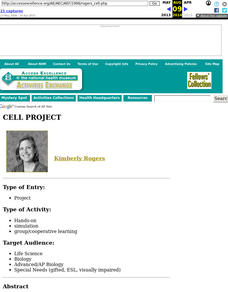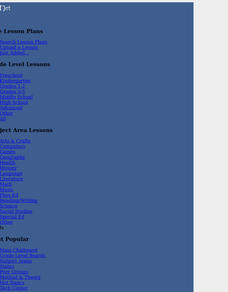Curated OER
Cell-to-Cell
Ninth graders use online tutorials, class discussion, presentations and scientific articles to explore types of cells along with cell structure, function and behavior. They explore ethical questions related to cells and disease.
Curated OER
The Gift of Life - Day 2: "Cell & Organelle Time to Tell" and "World in Color" (Chapters 2-4)
Students complete a cell biology lesson and a color lesson based on The Giver. In this biology and reading comprehension lesson set, students examine cells using microscopes. They look at the organelles and listen to How Much is a...
Curated OER
Cell Structures
High schoolers differentiate between a prokaryotic and eukaryotic cell and give examples of both types. They differentiate between a plant and animal cell. Students will be able to name features common to both as well as unique features...
Curated OER
Cell Membrane / Transport Drawing Project
Biology buffs illustrate the workings of the cell membrane when they complete this checklist. Not only do they draw the structure, they also draw gradients and mechanisms for the transport of materials across the membrane. Your advanced...
Curated OER
Plant and Animal Cells
Students investigate parts of a cell. In this plant cell lesson, students determine the difference between plant and animal cells. Students discover that coral is an animal based on cell characteristics. Students create puppets to...
Curated OER
Modeling the Cell Membrane
In this membrane permeability worksheet, students read introductory information about the cell membrane structure as it pertains to permeabillity and draw a representation of the membrane as they complete a lab. Students record the...
Curated OER
Cell Organelles
High schoolers explore biology by researching living cells. For this living organism lesson, students participate in a role-playing activity in which all the high schoolers in class form one plant cell by portraying specific parts of a...
Curated OER
The Cell
Students visualize plant and animal cells, explain the parts of a cell and their functions and distinguish plant cells from animal cells. Working Students, in groups, must present a particular portion of a cell to the entire class.
Curated OER
Plant and Animal Cells - Are they Different?
Learners observe the similarities and differences between plant and animal cells. In this cell activity, students use microscopes to observe self prepared slides of animal and plant cells.
Curated OER
Travel Brochure for a Cell
High schoolers create a brochure to entice readers to 'visit' their cell organelles and functions 'amusement park'. Students use humor and 'roadside attractions' for an inspiration - 'visit the ribosomes to watch proteins synthesized...
Curated OER
Cell Project
Students investigate cells. They discover what cells are, where they are found, what they do and what they are made of. They construct a giant cell that is posted on the bulletin board.
Curated OER
The Case of Regulation in Cells
After your biologists have learned about transcription, translation, and gene regulation, they work in a small group to create a poster of a system that serves as an analogy of the gene regulation process. They share their creations with...
Curated OER
Defining the Difference Between Prokaryotic and Eukaryotic Cells
Students examine microscopic life by conducting a scientific investigation. In this cell analysis lesson, students define the prokaryotic and eukaryotic cells and discuss their word origins. Students view each type of cell on slides...
Curated OER
The Great Archeological Dig
Learners explore biology by identifying a diagram. In this cell anatomy lesson, students read a story about archeology and conduct a fictitious archeology dig in class in which they search for animal cells. Learners define a list of...
Curated OER
Structure of Natural Narratives
Class pairs select a prompt from a provided list and tell (and record) their story to their partner. They then examine linguist William Labov's model for natural narratives, and apply his model to their tale. Next, class members watch...
Curated OER
Learn DNA Replication
Students explore physical science by participating in a science role-play activity. In this DNA structure lesson, students discuss the different parts of the code that makes up our DNA and instructs our cells. Students utilize the...
Curated OER
Bee Pollen Popular
The world would be a much different place without the help of pollinators. Read about the important role bats, hummingbirds, and various insects play in plant reproduction, exploring the interdependence of living things in an ecosystem....
ESL Kid Stuff
Prepositions of Location
Over, under, beside. Language learners practice using prepositions of location to answer the question, "Where is . . ."
Curated OER
DNA - The Double Helix
In this DNA worksheet, students read information about DNA and messenger RNA. Then students complete 16 short answer questions and color 2 images.
Curated OER
Surface to Volume Ratios
High schoolers measure the rate of diffusion and to calculate the surface area to volume ratios of varying cell sizes. The lesson is very clearly organized with a useful student worksheet provided. They perform a lab experiment which is...
Curated OER
The Euglena and Spirogyra
In this Euglena and Spirogyra worksheet, students read about these two Protozoans and they answer fourteen questions about their specified structures and functions. They color a diagram of Euglena and Spirogyra and label their parts.
Pennsylvania Department of Education
Animal Classes and Their Ecosystems
Students explore animal characteristics by participating in an environment identification activity. In this animal habitat instructional activity, students discuss a range of different wild life and the ecosystems that they are a part...
Curated OER
Over-the-Counter Culture
Students explore the changing consumer habits of Americans of various socioeconomic classes. They examine the exact costs of products, services and interest rates mentioned in the article and reflect on their own spending habits and...
Curated OER
The Euglena
In this euglena worksheet, learners read information about these unicellular organisms. Students then color in the different structures of the euglena on a diagram. Learners complete 10 short answer questions.























